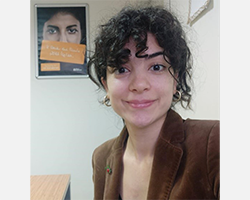Personal story: Clinical psychologist Pelşin Ülgen works to support Syrian refugees in Turkey

WHO
When Pelşin Ülgen graduated, she decided to seize an opportunity and accept a job offer at the Refugee Health Training Center in Istanbul as a clinical psychologist. Today, she’s a member of a psychosocial support team providing services to Syrian refugees in Turkey.
“Our team is just great. We support each other every time we need each other’s help or advice,” says Ülgen. “Through teamwork, I really feel we have accomplished something and been able to bring about real, concrete change for the better for the people we are here to help. I feel very lucky to be a part of this creative and supportive team.”
The job is not always an easy one. As part of the Turkish Ministry of Health’s Refugee Health Training Center, supported by the WHO Country Office in Turkey, Ülgen works together with both Turkish and Syrian psychologists, social workers, outreach workers and nutritionists within a specific project funded by the German Government through KfW Development Bank. Many of the project’s beneficiaries share tragic and deeply traumatizing experiences.
“My job is such a rewarding one, but it’s not always the easiest. Listening to traumatic experiences, trying to help – which sometimes works and sometimes doesn’t – also affects our own mental well-being,” Ülgen explains. “But my team has helped me a lot. They were there for me whenever I had a rough day.”
According to her, the value of the work makes up for the rough days. “I feel that I am touching lives and making a difference – however small or substantial that difference might be.”
Knitting networks
Some of Ülgen’s favourite moments took place during one of the Centre’s group activities arranged for women, many of whom had extremely tragic experiences behind them.
“Many of the women were afraid even of getting out of their homes and therefore didn’t have any social life. Isolation was a big problem,” Ülgen explains.
“So, we organized an activity called ‘Knit to connect’. The women came together to knit, but also had a chance to build their social networks and connect with other women in the same situation. This networking even helped many of them find employment, but first and foremost they were able to support each other and build friendships. While getting together to knit, they also touched each other’s lives. This simple social activity had an incredible value for our beneficiaries and for me as a psychologist,” says Ülgen.
She expresses that this experience of mutual support and encouragement is one that she will never forget.
Creativity in times of COVID-19
Even though the COVID-19 pandemic has inflicted some limitations on the work and daily routines of the Centre, Ülgen says they are still trying their best to support the well-being of refugees by all means possible.
“We have found alternative and creative solutions. We reach out to children and adult beneficiaries through available communication methods such as phone calls or Skype meetings. We have continued most creative activities such as painting and storytelling for children in order to support them through these difficult times,” she says.
“We didn’t stop working during the pandemic. We were able to carry on with hope and a conviction that better and healthier days for everyone will come.”
Partnering for support
With the financial support of the German Government through KfW Development Bank, WHO has been conducting the project “Supporting the employment of Syrian personnel in the Turkish health system” since January 2018. Within the scope of this project, WHO provides:
- support for the provision of medical services in Refugee Health Training Centers;
- outreach and facility-based psychosocial services and health education to refugees by hiring and coordinating psychologists, social workers, outreach workers and nutritionists;
- referral services by hiring case managers and bilingual patient guides;
- support for older refugees and those living with disabilities by hiring home care staff; and
- on-the-job training for staff and group sessions for home-care providers with the assistance of psychologists.



